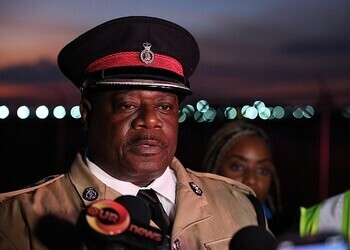The Bahamas police force is engulfed in a scandal following US allegations of a police-sanctioned cocaine trafficking scheme that underscores the pitfalls the United States faces in working with foreign law enforcement, as well as the continuing importance of the island nation as a drug trafficking hub.
US federal prosecutors alleged in a November 27 indictment that two high-ranking members of the Royal Bahamas Police Force (RBPF) and one Bahamas military official formed a cocaine trafficking network, along with 10 other Bahamian and Colombian citizens.
Since at least May 2021, corrupt government officials and security forces in the Bahamas have facilitated the arrival of cocaine shipments at airports around the nation’s many islands, according to the indictment. The shipments were flown in on charter flights from Colombia, Venezuela, and elsewhere in the Caribbean.
The defendants then allowed cocaine-laden go-fast boats, yachts, and shipping vessels to depart the Bahamas to the nearby US coastal state of Florida. In return, the officials received or planned to receive bribes from traffickers ranging from $10,000 to $2 million.
“The increase in cocaine flow through the Bahamas has been a direct result of drug-fueled corruption that has infected various Bahamian institutions,” prosecutors stated in the indictment. “These corrupt RBPF and Bahamian government officials support the drug trade into the United States at every turn.”
SEE ALSO:Former Premier of British Virgin Islands Guilty in Landmark Drug Case
Key to enabling the trafficking scheme, the indictment highlights, was the close anti-narcotics relationship between the Bahamas and US entities like the DEA and the Coast Guard.
One of the defendants shared sensitive US Coast Guard information with traffickers to help them avoid detection, the indictment alleges. Prosecutors also accused RBPF officials of providing the DEA with false information and denying them access to seized cocaine.
The indictment sparked controversy in the Bahamas capital, Nassau, which peaked on December 4. As anti-corruption protesters gathered outside parliament, inside, the opposition party was ejected from a parliamentary session after one of its members threw a ceremonial object out the window. The same day, Prime Minister Philip Davis announced the resignation of RBPF Commissioner Clayton Fernander, though he was not directly implicated in the conspiracy. Davis nominated a replacement for Fernander, but local media reported that his selection has yet to be confirmed.
Questions about politicians’ involvement in the scheme are fueled by a section of the indictment in which one of the RBPF defendants asked for a $2 million bribe on behalf of a “high-ranking Bahamian politician,” which the indictment did not name, in exchange for “facilitating and insuring cocaine shipments.”
The DEA and the Coast Guard declined to comment. The RBPF did not respond to requests for comment.
InSight Crime Analysis
The case against Bahamian security officials is the latest in a series of efforts by the United States to crack down on cocaine-related corruption that infects many ally nations and shows how local authorities can leverage the benefits of US cooperation to cover drug trafficking.
Former Honduras President Juan Orlando Hernández, who was sentenced to over 45 years in US prison for drug trafficking in June, was a staunch US ally during his two terms as president, working closely with the United States to extradite drug traffickers while maintaining an image as a “tough on crime” president.
In another emblematic case of a US ally gone awry, Genaro García Luna, former chief of public security in Mexico, received a 38-year US prison sentence in October for accepting millions of dollars in bribes from drug trafficking organizations, all while receiving national and international awards for his security achievements and working closely with multiple US government agencies.
As the recent indictment shows, corrupt Bahamian authorities also took advantage of US anti-drug efforts, this time through the framework of Operation Bahamas, Turks and Caicos (OPBAT). Established in 1982, OPBAT is a coordinated smuggling interdiction drive designed to close down what had become a cocaine highway passing from South America, through the Bahamas, to the United States in the 1970s and 80s.
SEE ALSO:Narco-Subs Sail the Caribbean
As a result of increased interdiction, cocaine seizures in the Caribbean dropped from 75% of all seizures between South America and the United States in the mid-1980s to just 10% in 2010, according to the United Nations Office on Drugs and Crime (UNODC), as traffickers explored other routes.
Now, the Caribbean route is showing signs of a resurgence, with rising seizures in places like the Dominican Republic and the French Caribbean. As the indictment highlighted, the Bahamas is also becoming “increasingly valuable” to cocaine traffickers.
Coast Guard spokesperson Lieutenant Commander John William Beal told InSight Crime that the case is unlikely to affect the two countries’ working relationship.
“The US Coast Guard remains committed to our partnerships and collaboration with military and law enforcement agencies in The Bahamas.”
Featured Imaged: Elvis Curtis, one of the Bahamas police officials mentioned in the indictment, speaks at a media event. Credit: Dante Carrer / Tribune242
Source link : http://www.bing.com/news/apiclick.aspx?ref=FexRss&aid=&tid=675b2f9528244c459cd765b3903b26f6&url=https%3A%2F%2Finsightcrime.org%2Fnews%2Fbahamas-police-turmoil-over-drug-trafficking-case%2F&c=7108286770656494136&mkt=en-us
Author :
Publish date : 2024-12-12 04:45:00
Copyright for syndicated content belongs to the linked Source.
